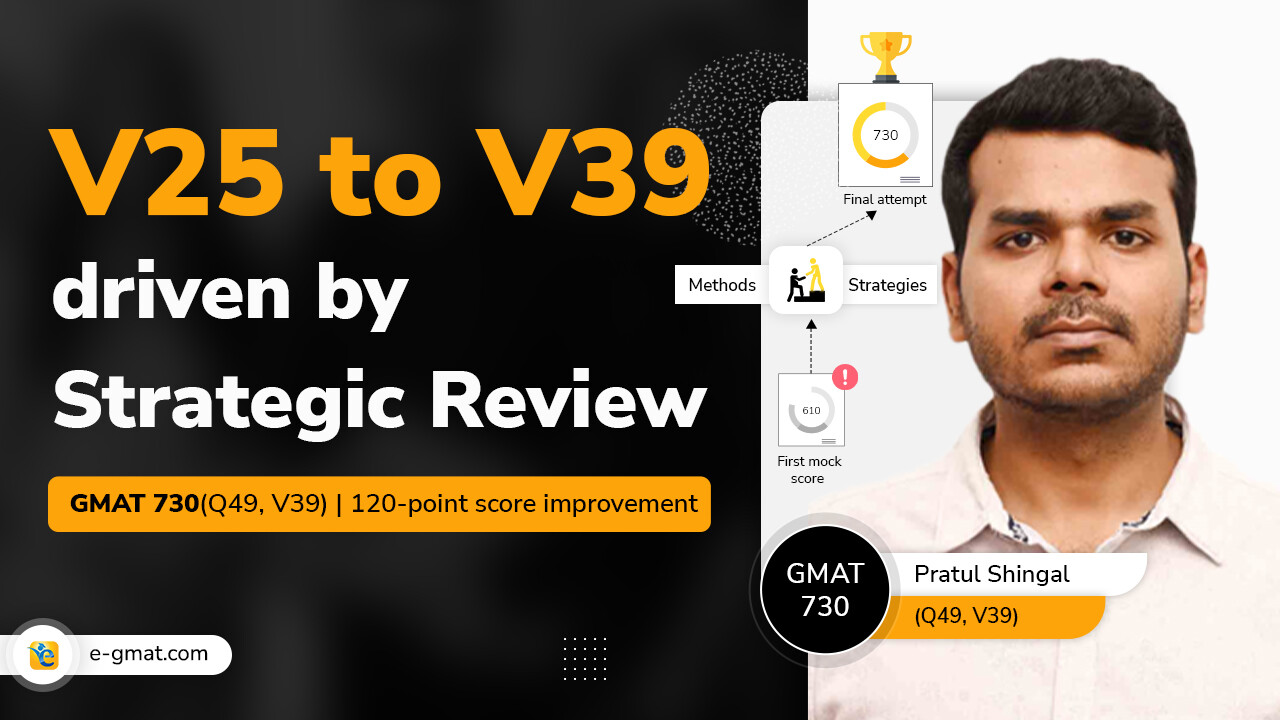Success is the sum of small efforts that are repeated day in and day out.
Pratul surpassed his own expectations with a GMAT 730 (Q49, V39) in his second attempt. Given his engineering background, he was confident with quant but needed to improve significantly in verbal. He started his GMAT journey with a 610 (V25) as his first mock score and progressed to 720, which was his best mock score.
Despite the damages he suffered due to his overconfidence in quant and complacency while preparing for the first attempt, everything began to fall in place when he got invited to enroll in e-GMAT’s LMP program.
From revisiting the course to comprehensively doing the strategic review of his performance, Pratul now had the clarity and the right guidance to bridge the gaps that he had been clueless about earlier. His mocks were now reflecting his improved verbal ability and the renewed confidence he’d gained with the help of his mentor.
Watch Pratul’s journey of how he made a 120-point score improvement and the strategies that helped him go from the 39th percentile to the 88th percentile in verbal.
Pratul’s GMAT journey overview
Rashmi: Congratulations Pratul. Thank you for taking out time to share your experience with us. How did you feel when you first saw the scores?
Pratul: I was shocked. I never scored more than 710-720 in any of my mocks. I did not expect to get a 730, and that too with a high verbal score. I was expecting my quant to be better, which I’d hoped would be the one helping me score high on the GMAT, but instead, quant disappointed me a little. I am happy with my overall score.

Rashmi: Your journey to 730 hasn’t been easy. Tell us how the idea of taking the GMAT came to you and how’s your journey been.
Pratul: I started preparing for GMAT in April 2021 with online resources and free courses. Soon I realized that despite focusing on verbal, I was not getting the required incremental knowledge I needed. I was searching for a course when my friend recommended that I should take the e-GMAT free trial. He told me to not think twice and take the subscription if I liked the trial experience.
I took the trial course, where they explained the basics of verb-ing modifiers, verb-ed modifiers, and pre-thinking. I instantly felt that the e-GMAT course was what I required, as it focuses on the basics, which is the must-have to score well in GMAT verbal.
Many tricks are available online, but those don’t work for all questions. I wanted to learn the fundamentals to help me understand verbal and quant in depth.
I took the trial course, where they explained the basics of verb-ing modifiers, verb-ed modifiers, and pre-thinking. I instantly felt that the e-GMAT course was what I required, as it focuses on the basics, which is the must-have to score well in GMAT verbal.
Many tricks are available online, but those don’t work for all questions. I wanted to learn the fundamentals to help me understand verbal and quant in depth.
I took the course in the first week of October ’21. My goal was to first go through the course entirely and understand the basics well. The e-GMAT course is structured to guide you on how to go about it. It is crucial to follow that structure. If you start with it, you’ll automatically know the path forward. This structured learning approach also brings in the discipline to help you reach your desired score.
Verbal preparation with e-GMAT
I began with SC in verbal, and it took me about one month to finish as I was also working then. After 10 hours of the work day, I’d study for one or two hours at night on weekdays. Much later, I realized that unless I understood the question’s meaning, I’d be unable to apply the SC methods.
Once I was done with the concept files of SC, as the course suggested, I took cementing quiz and did not do well there. With the performance analysis available, I found out where I was faltering. That data available on the platform is beneficial in identifying the knowledge gaps. As I followed the course further, I understood how to fix those gaps and increase my ability in SC. As I started scoring well in SC cementing quizzes, I moved on to CR and RC course completion and planned to take the GMAT test in March, but my verbal score was still bad; V25.
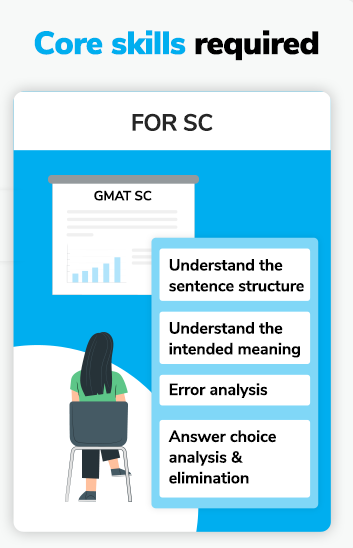
Despite my improved ability post-cementing stage, I could not understand why I scored low. I realized there were still some gaps. I later learned about my mistake: I was not focusing enough on meaning. Meaning plays a critical part in verbal preparation., without understanding the meaning, it’s impossible to score well in verbal, and it further impacts the overall GMAT score.
I later learned about my mistake; I was not focusing enough on meaning. Meaning plays a critical part in verbal preparation, without understanding the meaning, it’s impossible to score well in verbal, and it further impacts the overall GMAT score.
My first GMAT score, 680 was eye-opening. I was asked to redo the entire SC course.
Like everyone, I had also planned my GMAT preparation and time committed to it, and revisiting SC was a tough call, but I needed it.
e-GMAT support and LMP
There were unidentified gaps that required fixing. After going through SC the second time, the importance of meaning for verbal became clear to me, and with that, I could now see improvement in all sections SC, CR, and RC.
That’s when the e-GMAT team approached me for the LMP program. They suggested that since I was making improvements, my mock scores were stuck at 680-690. The guidance under the LMP program will help me achieve my target score. I enrolled for LMP in June.
With the program, I learned about the third and last correction that I needed to make the necessary improvement, and that was strategic review. Like the meaning-based approach, the strategic review was always there in the course, but I could not understand it.
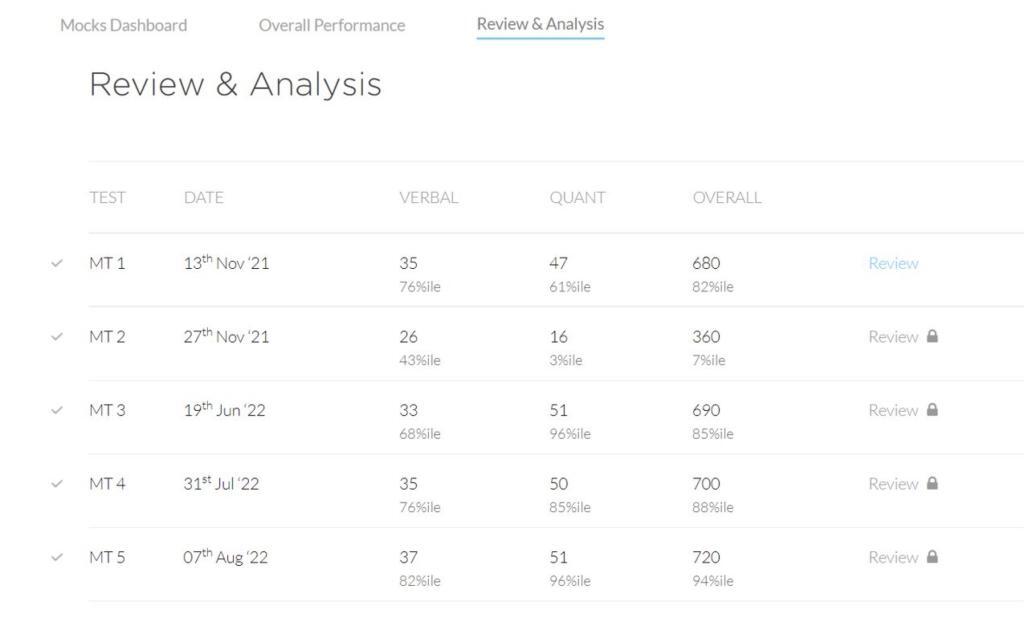
The strategic review was one of the most essential things I learned much later in my journey of GMAT preparation. How would you know where you are faltering unless you do the review? As it’s said, if you repeat your mistakes multiple times, it is not a mistake but a habit. This also applies to GMAT; if you are making a mistake and do not review it, you’ll continue with it.
Two months of structured learning with the e-GMAT verbal course and then the Last Mile Push program helped me a lot in scoring 730. My journey to GMAT 730 was incredible because of the insights and the learning I got from the course. The lessons were useful not just for the quant or verbal but also in life.
Time Management for working professionals
Rashmi: You are a working professional with 10+hour working hours per day. Could you tell us how you managed your time for the preparations and your work parallelly?
Pratul: Yes, it gets tricky. After working for ten hours, you are left with only an hour or two to prepare. As I said earlier, I did not follow the course the first time and missed out on various critical aspects. I became complacent with the mere 60% I scored on the quizzes.
To utilize the course to its optimum potential, you must follow it the way it’s structured. It speaks to you; once you reach a milestone, it asks you to review and correct whenever there is a gap. That is the beauty of the course.
To utilize the course to its optimum potential, you must follow it the way it’s structured. It speaks to you; once you reach a milestone, it asks you to review and correct whenever there is a gap. That is the beauty of the course.
After every application file, the platform asks you keep revisiting concepts unless you score 80%. I skipped this and ended up having to do the course again.
So, if you have only two or three hours a day, ensure that time is dedicated to the course. My advice is to spend time wisely. If you do, your journey will be good, and you’ll be able to achieve your target score.
Rashmi: It’s best to do the course the right way in the first attempt, but it also takes courage to accept the mistake and return to get things right; that’s what you did.
The first time, you were using brute force, solving too many questions, but the second time, you started with the strategic review and making improvements. This change got you from V25 to V39.
Methods for verbal improvement
You also mentioned the meaning-based approach for SC; how did you implement that in CR and RC?
Pratul: SC differs from CR and RC as you apply concepts there. Although the meaning-based approach is relevant to all, you try understanding the comprehension, sentence structure, and intended meaning in RC and CR. Only if you’ve done a strategic review can you know all this.
I did well in CR in the first attempt itself, but I was still lacking in pre-thinking. I’d target questions with the thought that answer choices would give me the answer. It is a wrong approach, as all the answer choices may seem correct because minor nuances differentiate the correct answer from the wrong one. You’ll be confused. Only if you pre-think well, it’ll come to you.
I understood pre-thinking better while doing the strategic review. During LMP, I was asked to go back to all the previously done questions for strategic review, and that exercise forced me to pre-think all possible scenarios for the correct answer. There was no looking for a solution in the given answer choices anymore. With pre-thinking, the correct answer choice comes to you, and this is what you should try to achieve in the first attempt at the course. Do not underestimate pre-thinking; it is one of the most critical learnings.
RC is about reading the passage comprehensively; once you’ve understood the passage, you’ll be able to solve all the questions in barely a minute. Earlier I’d take 10-12 minutes to read a passage, and even after that, I’d struggle to understand the explanation videos of the solution.
In one of the solution videos, I learned the importance of keywords in the passage. Earlier I’d read the passage but missed the keywords. I realized how keywords can change the meaning entirely or give clarity to the author’s intended meaning. Once I started noticing keywords in the passages, I could solve all questions in 30 to 40 seconds.
In the actual test environment, RC can be very decisive in your overall verbal performance and helpful in managing the time you may have lost in SC or CR. The course taught me how to read the RC passages well, which, if you don’t know, you can’t leverage the time advantage it can offer.
Rashmi: I remember you mentioned from being a non-reader, now, with all the new skills you’ve acquired, you took up reading recently.
Rashmi: You were a non-reader earlier, and now, owing to the new skills you acquired during the course, you’ve become an avid reader. Tell us about this transition of yours.
Pratul: Yes, I’d read one or two books a month, but I’d not understand it, which has changed now.
While preparing for the GMAT, I used to read New York Times articles and a great book with very complex language. But it mainly was skimming through the pages and not understanding the meaning completely. By the end of my preparation journey, practicing the meaning-based approach for RC passages, I can now read a 1000 -1500 words article in 15 minutes with a complete understanding of the meaning. That is the beauty of the course, if you follow it right, the sentences will speak to you, and the meaning will come to you directly.
Rashmi: Indeed, you’ve put it beautifully. The skills we learn for the GMAT are not limited to the test; it remains with you as a life skill.
Quant preparation with e-GMAT
Coming from an engineering background, you knew you were good at quant. Although you went through the e-GMAT quant course as well, you were very selective with the topics and not as thorough as you were while following the e-GMAT course for verbal.
What would you tell people who are focused on one section? How should they approach the section they are confident about?
Pratul: My final quant score is a classic example. I scored Q50-51 in my mocks and my first GMAT attempt Q51, but I scored Q49 on the last test
Having confidence in one section should not mean that you ignore the other section. Don’t be overconfident. There will always be questions that will demand you to think beyond what you’ve done before. The e-GMAT course prepared me well for the topics I focused on while going through the course. I could solve all the tricky questions from those topics.
I’d spend half an hour every day on quant. For topics such as remainder, probability, GCD, LCM, etc., I went through the application and practice files to cement the concepts well, which helped me during the exam. However, my preparation was not as thorough with quant as it was for verbal.
Understanding question correctly is another crucial aspect of quant. e-GMAT taught me the correct way to approach those questions. There are a few features in the course with which you don’t waste time if you are already good at specific topics. So, if you’re preparing for GMAT, you must cover all the sections with equal attention; the actual test environment is very different, and you must prepare for GMAT hard-level questions across all topics.
PACE stands for Personalized Adaptive Course Engine. It’s an engine that creates a custom course tailored to your abilities. If you are starting with high quant ability, PACE will ensure that you only do portions of the course you need help with. Watch this video to know more about P.A.C.E
Pratul’s mock attempts
Rashmi: How many mocks did you attempt this time?
Pratul: Before my first GMAT attempt, I had taken 2 mocks and scored 680-690. SIGma-X mocks are adaptive, which means if you’re doing well, you’ll be challenged with higher difficulty levels. Also, for the topics, you repeatedly get questions incorrect. The system keeps throwing questions at you from those topics until you understand them completely and start getting them right, even for the higher difficulty level questions.
I’d like to mention an incident here – When for a particular type of SC question that I was not able to understand, I kept marking the questions incorrectly. It wasn’t until I did the strategic review of those questions that I learned about my mistake!
Try Free SIGma-X mock to know your current GMAT ability and a detailed analysis of your performance.
I’d like to mention when for a particular type of SC question that I was not able to understand and had been marking the questions incorrectly until I did the strategic review of those questions and learned about my mistake.
After my first GMAT attempt, I did not focus on reviewing incorrect questions. I concentrated on quant and verbal concepts and then cemented them with quizzes. For three months, I did not take any mock, and in the fourth mock, I scored 700(Q50, V34).
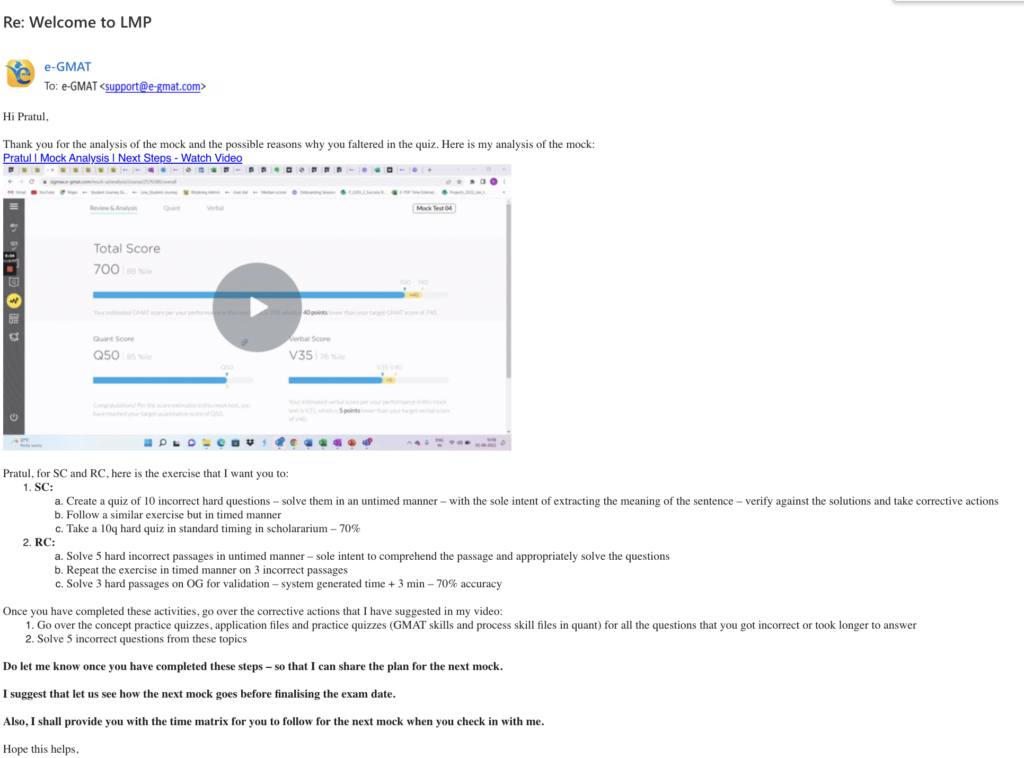
Only after I did strategic review as directed during the LMP did I realize I did well in RC but faltered in SC and CR. At this point in my journey, I realized I was not pre-thinking well. Then I gave 2-3 days to SC and then attempted my next mock, in which I scored 720 (Q51, V35) this time, I did well in SC and RC but did not perform well in RC, which was surprising again.
I reached out to e-GMAT support seeking help, and then I received an 18-minute video explaining various vital concepts of quant and verbal. As you go along the course, you build the sense of using strategies, and that video helped me refresh all my learnings to date.
Rashmi: Yes. Except for RC, you performed well in your last mock. As you said, the foundation was already there; the last bit of tweaking put everything in place for you.
You did not do more than 2 mocks, which helped you surpass your target score. Unlike many who believe that it takes 10-15 mocks to get there, you could review, identify the gaps and take necessary corrective measures in just two mocks.
Tips for GMAT aspirants
What tips would you give to the GMAT aspirants targeting a high score?
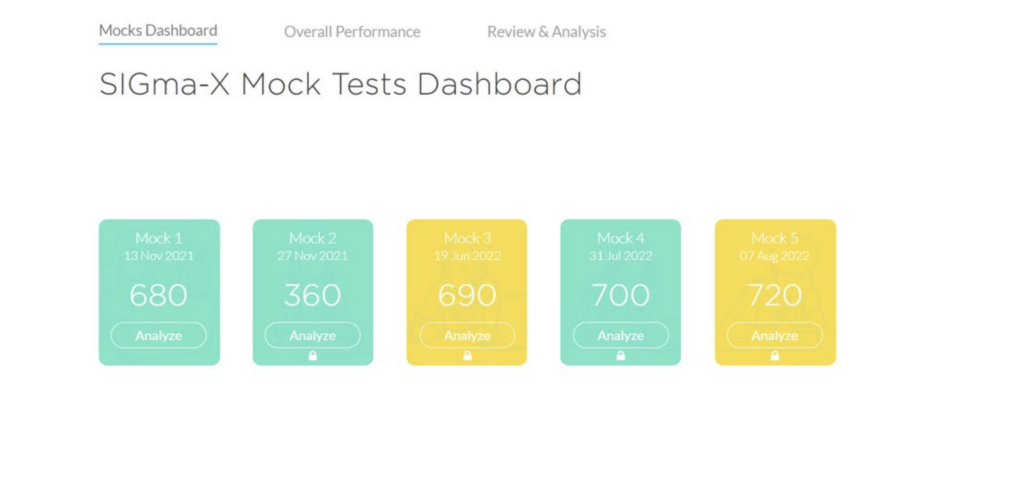
Pratul: Firstly, “Don’t go all out with questions. Instead of solving too many questions, go only for quality questions followed by the strategic review”. The questions available on e-GMAT are good and well structured.
My second suggestion is “Don’t select any random course for GMAT preparation”. Find out what is relevant to you and which course can help you reach your target score.
The third would be – “Time management is critical; GMAT preparation doesn’t require more than four months if you prepare with complete honesty. A well-structured, focused study for four months is all that you need to achieve your target score.”
I hope my learning will help others with their preparation.
Rashmi: Thank you for your inspirational story. I am sure many will benefit from it.


